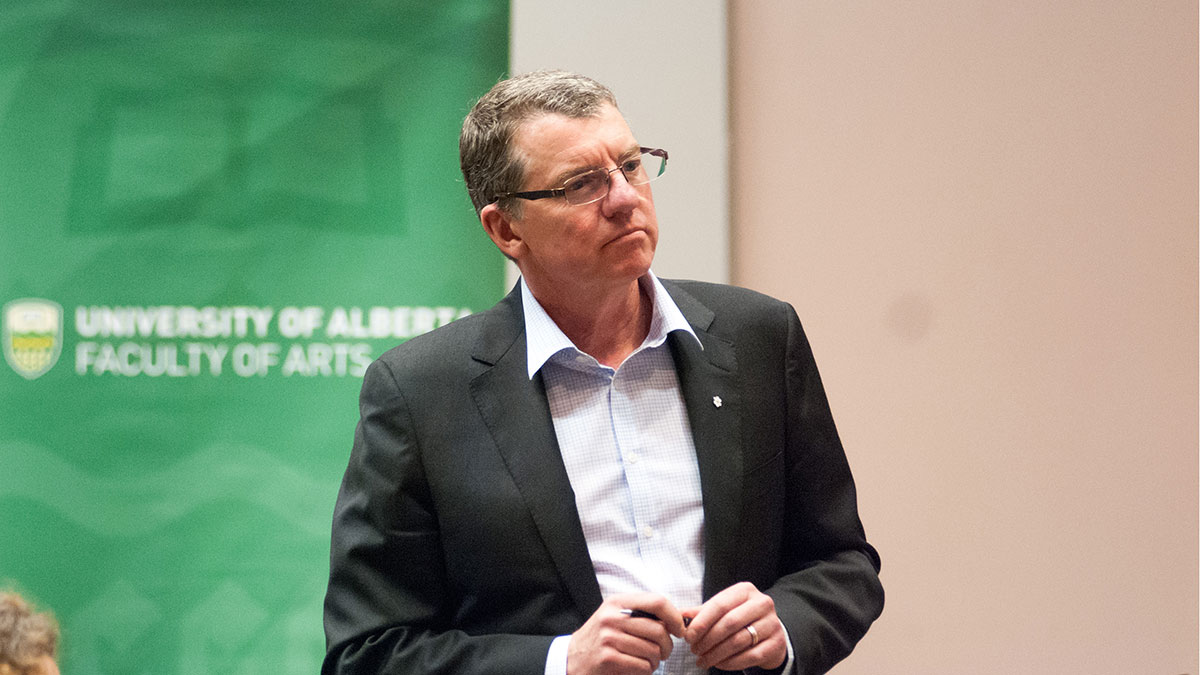Message about university conduct during election raises concerns about academic freedom
 Richard Catangay-Liew
Richard Catangay-LiewA directive sent by the university president about conduct during elections was not clear enough about maintaining academic freedom and freedom of speech, some professors say.
The communication was sent to deans, chairs, and directors of centres on March 1 by University of Alberta president David Turpin. In the communication, Turpin outlined the rules put forward by the Election Act that includes rules about post-secondary institutions during an election. However, some professors have raised concerns about the vagueness of the directive regarding academic freedom and freedom of speech after a political event was cancelled at Augustana campus. Turpin has since issued a clarification, however, some say the problem still persists.
In the original statement, Turpin spoke to the university’s role as a “politically neutral organization” during the upcoming provincial election. There are rules set out in the Election Act prohibiting “the use of public university resources for political or campaign purposes.” These resources include political party funding from university funds, and distributing campaign materials with university email lists. Additionally, the university as an institution cannot endorse any party.
However, Carolyn Sale, an English and film studies professor, said the communication may have been interpreted to suggest certain activities shouldn’t be happening on campus.
Her concerns come from the cancellation of a “Coffee and Conversation” event on March 21 at Augustana to discuss religion and politics in Alberta.
“The point is that the communication doesn’t clearly say a couple of things: that every faculty member at the institution has academic freedom and that every member of the university community, including students, have freedom of speech,” she said.
In a subsequent communication sent to academics from Turpin, he said the university didn’t see the Elections Act as “limit[ing] or interfer[ing] with academic freedom” or “preclud[ing] academic staff members or postdoctoral fellows from engaging with political parties, their candidates or other political party representatives in conducting teaching and research, including their public service and public discourse work.”
The Gateway reached out to Turpin for further comment, but Turpin said he thinks “the statements he made regarding the issue speak for themselves.”
In an email sent by Ian Wilson, director of the Ronning Centre at Augustana, he said the cancellation occurred after the president’s office asked the university to “ensure that [their] activities do not influence the election in any way.”
“[It’s] really, deeply unfortunate that these interpretations of [the communication] are leading to any suppression of teaching activities, research activities, political conversations on any of the university’s campuses,” Sale said.
Sale added while it’s fine to remind the university community that the university can’t be engaging in certain activities institutionally, the communication should have started with a statement about the importance of freedom of speech. She said academic freedom is being infringed upon if any faculty member is made to feel uncomfortable about their regular activities and decides not to engage in them.
“[The university culture is] all about freedom of thought, freedom of expression, freedom of intellectual activity,” Sale said. “This is not how democracy works, democracy thrives upon, depends upon, free discourse.”
Sale added that when a professor is speaking on any matter, they are not speaking for the university, but instead as individual professors supporting academics and the pursuit of knowledge.
While the clarification email from Turpin addresses academic freedom, Sale said it fails to clarify the university’s position on freedom of speech. In a blog post on the matter, Sale said the event’s cancellation was not addressed in the clarification statement, as it involved “political scientists at the University of Alberta doing the job of analyzing the political landscape in Alberta and offering their views on it,” not staff interfacing with political parties and candidates. At events such as these, Sale added, it’s up to the public to decide what they want to do with the information they hear, as the professors are speaking for expertise and not for the institution.
Wilson said in his email the centre would still like to host the coffee and conversation event, but that it will “have to wait till after the election.”




